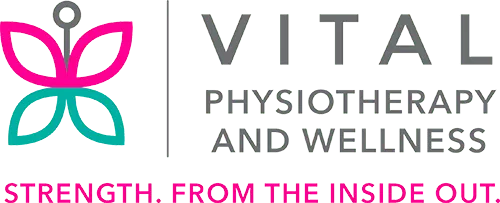As a Pelvic Health Physiotherapist, it’s no surprise that I spend a big chunk of my day talking, teaching, or learning about all things pelvic floor. At Vital, we help treat a number of different pelvic health concerns; vaginismus, pelvic pain, and prolapse to name a few. However, beyond treating the pelvis alone, we aim to optimize your health and move you beyond feeling just good enough, to feeling AMAZING. We want you to THRIVE. In order to do this, we understand that we have to treat you, our client, as a unique individual. One framework that helps us accomplish this is the Biopsychosocial Model of care.
The Biopsychosocial Model is a client centered and holistic model of care. It is a way of understanding that each of our aches, pains, conditions and symptoms are as different as the people who are experiencing them (1). At Vital, when we approach you as a unique individual, we can help you achieve incredible results. We acknowledge that it is you in your entirety; including your biology, psychological and social factors that shape your body’s response to the world!
What this means is that although you may be experiencing symptoms that are located in your pelvic floor, it doesn’t always paint the full picture. The truth is that your muscles (pelvic floor muscles included) respond to your brain and your brain fuels EVERYTHING. With this in mind I want to share with you 3 things that you may not realize are impacting your pelvic health! These are some of the sneaky things impacting your pelvic floor that can often go unnoticed, underestimated, or even ignored!!
STRESS
First of all it’s important to recognize that not all stress is created equal – some stress is good and some stress is harmful. When our brains perceive a stressor, it initiates a cascade of events that activate the sympathetic nervous system – also known as our fight or flight response. This response increases blood pressure and heart rate to pump blood to the muscles, leads to a release of epinephrine (aka. adrenaline), causing senses such as sight and hearing become sharper. All of these things happen, allowing us to avoid a physically unsafe situation such as a tiger running at us or a car speeding up toward us. However, while stress is essential to survival, we were never built for constant stress.
The truth is, stress is tricky to identify when it is low grade and chronic in nature. For most of us, stress is typically more mental than physical, but our body isn’t able to decipher between the two and reacts in much the same way (2). So what does this mean for your pelvic floor? Our pelvic floor gets direct innervation from our sympathetic nervous system. When we are stressed our pelvic floor responds by overworking and those muscles become over-recruited! Overrecruited muscles are tight and weak. If that’s not enough to convince you, here is a shortlist of conditions we see that are associated with SNS upregulation:
• Vulvodynia/Vestibulodynia
• Vaginismis/Dyspareunia
• Interstitial cystitis
• Irritable Bowel Syndrome
• Persistent pelvic pain
• Pelvic Girdle Pain
• Urgency and Frequency
• Incontinence
SLEEP
Sleep problems have nearly become an epidemic in Canada. In fact, 1 in 3 Candians aren’t getting enough sleep, and nearly half of Canadians report that they find their sleep leaves them unrefreshed in the morning (3). What about you? Do you feel you are getting enough sleep? Do you wake up feeling refreshed?
These statistics are concerning because sleep plays a very important part in our lives and can ultimately impact our ability to function. Sleep allows for energy conservation. During sleep, metabolism slows in both your body and brain. Sleep also plays a role with healing and immune function, and it is the time when information and memory are stored and consolidated. A good nights sleep also allows you to regulate your emotions and it’s during the REM sleep cycle that you process and filter these emotions.
With all this in mind, it comes as no surprise that poor sleep can impact our lives in a number of different ways! Potential impacts of poor sleep include irritability, mood fluctuations, difficulty with concentration, low energy levels and the list goes on! Of particular relevance, there is a very strong correlation between stress and poor sleep (and you now know what that means for your pelvic floor!).
Last but certainly not least, poor sleep and persistent pain (pelvic pain included!) have a few things in common. Whether it be difficulty falling asleep, disrupted sleep, or early awakening, poor sleep is considered a driver of persistent pain (2). What that means is that if you are experiencing pelvic pain that extends beyond 3 months, chances are one of the first things you need to address with your healthcare team is establishing good sleep hygiene and habits.
SUPPORT
On average, the majority of us have 3-5 close relationships (2). Within that group, how many of your relationships are supportive and nurturing? Are there any that you would consider toxic? These are important questions to ask yourself because social information can be used to either help us establish positive expectations around treatment or create negative ones. A partner, spouse, friend, or family member can impact our beliefs and perceptions about our treatment, pain, or pain experience (5). More notably, negative beliefs have been found to be a significant part of pelvic pain and conditions such as interstitial cystitis and irritable bowel syndrome (2).
Social Support also makes up a key part of Positive Affect. Positive affect is an “umbrella term that allows for the study of factors that are associated with resilience.” (2) Positive affect has been associated with a number positive health outcomes, such as lower morbidity, increased longevity, and it is also a strong predictor of the outcome of pain (2, 4-6). With this in mind, while we don’t entirely understand why, a supportive network (that includes us too!) plays a big role in your pelvic health, pain experience, and helps sustain you during times of chronic stress.
Stress, sleep, and social support are only three of many factors that can influence your pelvic health. However one thing is for certain; when we address you in your entirety, and approach health from a holistic perspective, we can help you achieve incredible results!!
ABOUT THE BLOGGER
Sara is a Pelvic Health Physiotherapist at Vital! Known for her empathetic nature and positive energy, Sara works side by side with her patients to understand their needs, concerns, and goals. Viewing her client’s health holistically, she works diligently to empower and motivate them along their rehab journey! Have questions? You can connect with Sara via. Email at [email protected]!!
_________________________________________________________________
Any information provided on this website (including on any and all site pages, blogs posts and blog comments) is provided for informational purposes only, and is not to be used or relied on for any medical, diagnostic or treatment purposes. This information does not create any patient relationship between you and Vital Physiotherapy and Wellness or its health care providers and should not be used as a substitute for professional diagnosis and treatment.
Please consult your health care provider before making any health care decisions or for guidance about a specific medical condition. Chana Ross and Vital Physiotherapy and Wellness expressly disclaim responsibility, and shall have no liability for any damages, loss, injury, or liability whatsoever suffered as a result of your reliance on the information contained in this website.
The opinions expressed in any blog posts on our website are those of the authors only. They do not purport to reflect the opinions or views of Chana Ross, Vital Physiotherapy and Wellness or its employees or health care providers.
By visiting this website, you agree to these terms and conditions, which may from time to time be changed or supplemented. If you do not agree to the foregoing terms and conditions, you should not use this website.
REFERENCES
1. Francesc Borrell-Carrió, MD, Anthony L. Suchman, MD, and Ronald M. Epstein, MD. The Biopsychosocial Model 25 Years later: Principles, Practice, and Scientific Inquiry. Annals of Family Medicine. 2004 Nov; 2(6): 576–582.
2. Carolyn Vandyken. Clinical Skills for the Treatment of Pain. Pelvic Health Solutions. 2018.
3. https://www.ctvnews.ca/health/five-shocking-facts-about-canadians-sleep-habits-1.3598273
4. Pressman SD, Jenkins BN, Moskowitz JT. Positive Affect and Health: What Do We Know and Where Next Should we go? Annual Review of Psychology. 2019; 70; 627-670
5. Pressman SD, Cohen S. Does positive affect influence health? Psychol Bull. 2005;131:925.
6. Hanssen MM, Peters ML, Boselie JJ, Meulders A. Can positive affect attenuate (persistent) pain? State of the art and clinical implications. Curr Rheumatol Rep.2017. Nov 9;19(12):80.
Let's Book Your First Appointment
You can relax knowing that you have options. Instead, you can stop feeling like it is your fault and get ready for a life-changing experience.

